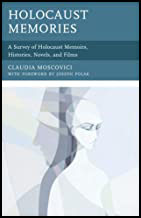 Holocaust Memories: A survey of Holocaust memoirs, histories, novels, and films, by Claudia Moscovici
Holocaust Memories: A survey of Holocaust memoirs, histories, novels, and films, by Claudia Moscovici
Review by Donna Andersen
Most of us have some knowledge of the Holocaust. We’ve heard about the concentration camps and gas chambers. We know one of Adolf Hitler’s objectives during World War II was the “Final Solution” — an attempt to wipe out the Jewish population of Europe. We know that six million Jews were murdered, plus millions more Communists, prisoners of war, gypsies, intellectuals, handicapped people and others.
We may have seen movies like Schindler’s List and Sophie’s Choice. Maybe we read The Diary of Anne Frank. But it’s doubtful that we understand the true brutality of the killings, and the depravity of the people who committed them.
Claudia Moscovici’s book, Holocaust Memories, captures the scope of the horror.
The book is a collection of 70 essays by the author, each one a summary or review of a classic book or film about the Holocaust. Some are well known, such as Night by Elie Weisel, and Eichmann in Jerusalem: A report on the banality of evil, by Hannah Arendt. Because each of Moscovici’s essays is short — usually only two pages — the painful history comes in small doses.
Many of the works were new to me, depicting particular aspects of the Holocaust that I didn’t know. The author Leni Yahil described what happened in Hungary: In less than two months, from May 15 to July 9, 1944, 440,000 Jews, more than half of the country’s Jewish population, were rounded up and sent to Auschwitz. Most of them died in the gas chambers.
How can people do this?
Moscovici knows about psychopaths — she is author of the Psychopathy Awareness blog. In some essays, she analyzes the perpetrators’ disorder. For example, she talks about Adolf Eichmann, a Nazi lieutenant colonel who was one of the main organizers of the mass deportation of Jews. Eichmann escaped after the war and fled to Argentina. He was eventually captured and tried for his crimes in Jerusalem.
Hannah Arendt, who covered the trial, was surprised that Eichmann seemed so normal and felt no moral responsibility for his crimes. As Moscovici points out, the reason for this is simple — the man was a psychopath. Failure to take responsibility for anything is one of the key characteristics of a psychopath.
Holocaust Memories is an exceptional work of scholarship about one of the darkest chapters of human history. For all those people who now say the Holocaust never happened — well, there are plenty of eyewitnesses who know that it did, because they lived it.




































 Growing up in a narcissistic family—is it abuse?
Growing up in a narcissistic family—is it abuse?